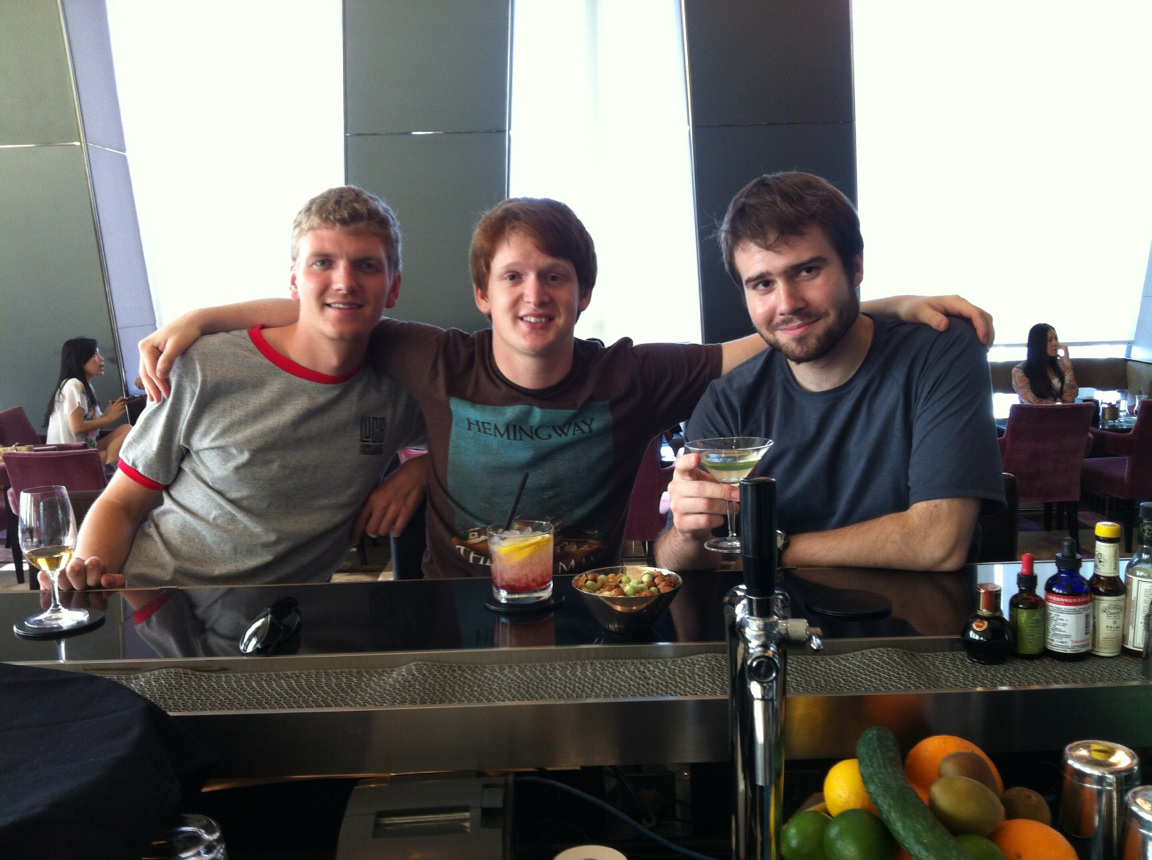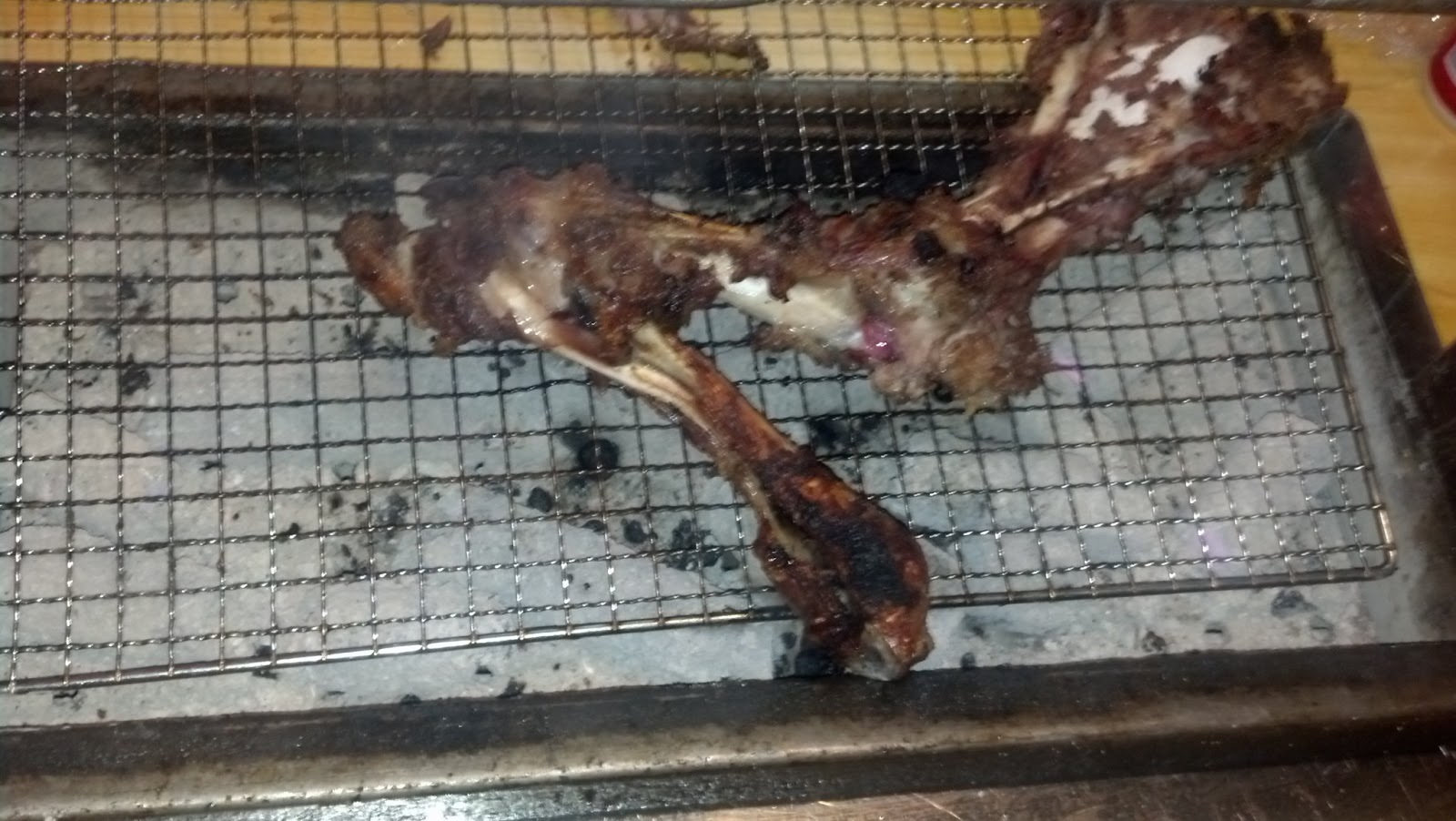So for a break from my past several interesting and informative (I hope) posts, I will now detail the most peculiar things I've eaten over the past couple weeks.
In the organ category, I've sampled both cow stomach and duck gizzards recently. The cow stomach was delicious, a nice slightly chewy texture that was served hot, both in temperature and spice. The gizzards were alright, more of a snack type food, served cool. They were also chewy and didn't have a particular strong flavor. Not as good as hearts, necks, or tongues, but they were still pretty good.
For other meats, I had myself some pork knuckles recently.
This was awfully fatty, a little excessively so in my opinion. They were fairly small for pork knuckles, without that much meat on them. Good sauce though. Couldn't eat all that much of them, because they were fairly greasy tasting, but they were worth trying. I've had better in Budapest though.
I also ate chicken wings over the weekend. While that's not-at-all strange, in China they're served on skewers, called 串儿/chuàner (you slur the n and the r together so it's pronounced something like chuarrrr, with a nice strong Beijing accent). This is the typical ways to serve wings and other bits of roasted meat in China, and 串儿 are a very typical food to eat after you've been drinking for a while and are out late at night. The wings I had were BT辣 (là), where 辣 means spicy and BT stands for 变态/biàntài, or "perverted." Unfortunately, they weren't super spicy, though it was a decent amount of spice, and they were accompanied by roasted tendon, which was quite tasty.
Additionally the other day, Martin, Ben, and I discovered a 驴肉店/lǘròudiàn near the language school. 驴肉 is quite a tasty meat, whose high regard is explained by the phrase 天上龙肉地下驴肉/tiānshàng lóngròu, dìxià lǘròu. This poetic turn of phrase, emblazoned on the side of the restaurant we found, proclaims that the heavens above have dragon meat, and the earth below has 驴肉. It ended being quite a delicious meal too, with bowls of soup made with 驴肉 accompanied by stir-fried 驴肉 captured between two fried buns. Fantastically greasy and delicious. What is the magical animal that 驴肉 comes from, you ask? Why, it's donkey of course. Delicious, delicious donkey.
The most interesting drink I've had to date would definitely be 绿豆沙/lǜdòushā, or green bean sand. I was really thirsty when eating dinner the other night and saw this on a menu. As I had never heard of it, I decided to give it a try. They presented me with a little plastic spoon and a little plastic tub filled with a transparent greenish liquid. At the bottom of the liquid was a bunch of sediment, the eponymous green bean sand. To drink, you mix to combine the liquid and sediment and consume with a spoon. It was served cold and turned out to be really tasty and incredibly refreshing, which is always a plus in a place where cold water is uncommon. (Okay, I should admit that you can buy cold bottled water everywhere you go. But you can't drink the tap water, and the Chinese habit is to drink hot water, not cold, so you never get cold water for free. Not that a bottle of water ever costs more than 50 cents. But it's the principle of the thing, dammit!)
Today, I had one of my favorite meals to date, so you're going to have to excuse me while I gush a little. Martin and I picked a random restaurant on the street, one of the the best methods for finding good food in China, and ordered four tasty looking dishes. Two of them were fairly standard, tasty but nothing special. The other two were the following:
On the left is one of my favorites: 干过茶树菇, dry pot tea tree mushrooms, which I've mentioned before. Nice and spicy, not oily at all, they really are a treat. On the right there is something new, some kind of 麻辣青蛙/málàqīngwā. 麻辣 is the wonderful combination of flavors, common in 四川/Sīchuán food, that results from combining chili peppers and a special type of spice known as the Sichuan peppercorn. This wonderful little berry (not actually related to peppers or peppercorns at all), which I may have mentioned before, has a pleasant floral aroma and a taste that is best described as numbing. It's a mild anesthetic, and consuming food cooked with them, or the peppers themselves, produces a strange buzzing/numbing feeling on the lips,on the tongue, and in the mouth, that is quite unlike anything else. It's one of my favorite flavors ever, especially when combined with the fiery heat of chilis. So the sauce of this was fantastic. As was the meat: 青蛙 is frog. I'm not quite sure whether this was bullfrog or some other type of frog, but it was delicious. There was so much meat packed into this dish, a relative rarity in Chinese dishes, and the flavor was fantastic, with frog tasting somewhat like the cross between chicken and fish: it has the taste of the former with the texture of the latter, though it's nowhere near as flaky as your average white fish. They're also super satisfying to eat, in that very visceral carnivorous sense, because you're eating the meat right off the bones of the animal. It was wonderful, and is a definite recommendation for everyone.
Of course, it's not all been strange foreign foods. A while back, I was looking over the menu at a lunch place and saw an item called 番茄肉酱面/fānqiéròujiàngmiàn whose picture looked promising. Literally, the name means tomato-meat-sauce noodles, so I was like, "That sounds delicious!" and ordered one. What I received was the following, and not at all what I expected.
I'm not sure if you can tell from this picture, but those noodles don't look, nor did they taste, particularly Chinese. After eating a little bit, I realized that I had managed to, in a Chinese fast-food restaurant, order a bowl of spaghetti bolognese. I asked for the hard-boiled egg to be added, but even without the egg it would've been a strange experience. It was still pretty tasty, mind you, and I finished every last bite, but it was bizarre. It did not taste Italian nor did it taste particular Chinese. It was quite strange.
Finally, I end with a picture of an item I found in a grocery store. Not food, exactly, but involved in the preparation:
This name does literally mean "corn embryo," but I'm assuming they mean corn kernel here instead. Not even sure what else a corn embryo could refer to...





